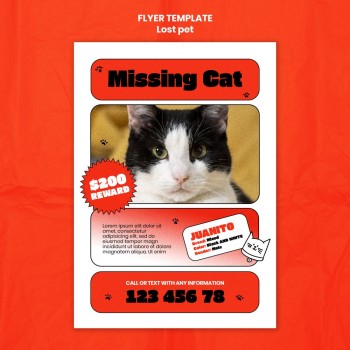
Losing a beloved cat can be a distressing experience for any pet owner. Cats are naturally curious creatures, and while their independent nature often leads to adventures, it can sometimes result in them wandering too far. In the UK, thousands of cats go missing each year, with many cases attributed to accidental escapes or an overwhelming desire to explore their surroundings.
Thankfully, there are practical steps you can take to maximise the chances of being reunited with your furry friend. This guide offers a comprehensive step-by-step approach, including tips, statistics, and expert advice, to help bring your missing cat home safely.
When you first realise your cat is missing, it’s crucial to remain calm. Panicking can cloud judgment and delay necessary actions. Start by thoroughly checking your home and garden. Cats are adept at hiding in unexpected places, such as cupboards, basements, attics, or under furniture.
According to the Cats Protection charity, up to 60% of lost cats are found within a 1.5-kilometre radius of their home. Joanne Wright, a spokesperson for Cats Protection, emphasises, “Cats are creatures of habit and often don’t venture far, even if they appear to be missing. Thorough local searches can make a significant difference.”
Once you’ve ruled out your home as the hiding spot, begin a systematic search in your neighbourhood. Walk around your area and call your cat’s name in a calm and familiar tone. Bring along their favourite treats or toys to attract them.
Speak to your neighbours and ask them to check their garages, sheds, and other outdoor spaces. Cats often seek shelter in these areas, especially if they feel scared or trapped. Provide neighbours with a clear description or photo of your cat to aid in their search.
Also, cats tend to be more active and visible during dawn and dusk. These times are ideal for conducting searches, as the environment is quieter, making it easier to hear their meows or spot them hiding.
If your cat remains missing after your initial efforts, it’s time to notify local organisations and authorities. Start by contacting:
Local Vets: Many people who find stray cats take them to nearby veterinary clinics. Leave your contact details and a description of your cat with local vets.
Animal Shelters and Rescues: Inform nearby shelters and rescue centres about your missing cat. Organisations like Cats Protection and the RSPCA often keep records of lost and found pets.
Microchip Databases: If your cat is microchipped, ensure the details are up to date and report them as missing to the relevant database, such as Petlog or Identibase.
Social media has become an invaluable tool for reuniting lost pets with their owners. Post clear photos of your cat, including identifying features, on local community groups, lost pet pages, and neighbourhood forums.
Print physical flyers with your cat’s photo, name, and contact information. Include a brief description of where and when they were last seen. Distribute these flyers in your neighbourhood, local shops, and community centres.
Emily Johnson, an experienced pet rescuer, advises: “Flyers are still incredibly effective, especially in smaller towns. A passerby might spot your cat and recognise them from your flyer, even if they don’t use social media.”
Cats often return to familiar surroundings when they feel it’s safe to do so. Create a welcoming environment by placing their favourite bedding, toys, or food outside your home. If possible, leave a piece of your clothing nearby, as your scent can reassure them.
For particularly elusive cats, a humane trap can be set up with bait such as their favourite food. Contact your local animal rescue organisation for guidance on safely using traps.
Finding a lost cat often requires time and consistent effort. While some cats may return home within a few hours, others might remain hidden or wander far, delaying their return by days or even weeks. Cats are naturally cautious creatures, and stress can cause them to stay in hiding longer than expected.
Persistence is key. Continue to search daily, both during the day and at night when it's quieter, as cats are often more active and less fearful in the dark. Walk through your neighbourhood, calling out softly and pausing to listen for any response. Revisit the same areas multiple times, as cats may move or change hiding spots over time.
According to Petlog, over 75% of microchipped pets are reunited with their owners, underscoring the importance of patience, persistence, and proper identification. Many stories of successful reunions occur weeks or even months after the pet went missing. By maintaining hope and continuing your efforts, you increase the likelihood of bringing your beloved cat home.
Prevention is always better than cure. Ensuring your cat’s safety can reduce the chances of them going missing. Here are some preventative measures:
Microchip Your Cat: A microchip is a permanent form of identification and significantly increases the likelihood of being reunited with your cat if they go missing.
Collars with ID Tags: Ensure your cat wears a breakaway collar with an ID tag, including your contact information.
Secure Your Garden: Regularly inspect fences and gates for gaps or potential escape routes.
Supervise Outdoor Time: If possible, supervise your cat when they are outdoors or consider building a cat enclosure.
Losing a cat is a heart-wrenching experience, but by acting quickly, staying persistent, and enlisting the help of your community, the chances of a happy reunion increase significantly. Always remember the importance of microchipping and creating a secure home environment to minimise the risk of future incidents.
As the renowned pet behaviourist Sarah Hill states, “The bond between cats and their owners is unbreakable. With the right steps and unwavering determination, even the longest separations can have joyous endings.” Take action, stay hopeful, and trust that your furry friend will find their way back to you.
Each year, numerous dogs, cats, and other animals go missing or are stolen. Notify Lost Pets Ireland about your lost pets, and we can inform thousands of people in your vicinity within five minutes.
Report Pet
We and selected third parties use cookies to give you the best browsing experience. By clicking Accept All you consent to the storing of cookies on your device for functionality, site navigation, analytics and marketing including personalised ads and content. You can adjust your preferences at any time.